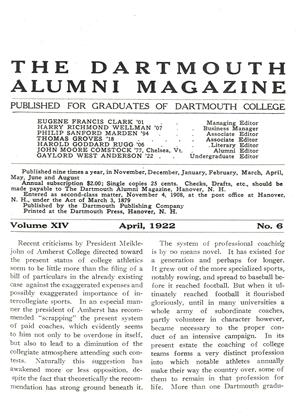Shortly after his return from Hanover, where he spoke at a smoke talk in College Hall, Christopher Morley, the well known critic and essayist said several nice things about the College in his "Bowling Green" column in the New York Evening Post.
"There is nothing more fascinating" wrote Mr. Morley "than visiting colleges, and we must admit that Dartmouth made a most happy impression on our mind. It is interesting to see how the college has turned its necessity to glorious gain—shut up among the frosty hills, far from the amusements with which towndwellers beguile the winter, it has made its snow sports a notable affair, and probably no activity at any college has been so widely published. In spite of its rapid growth—now some 2,000 students—Dartmouth happily retains the simplicity and quietness and corporate unity of a small college. Part of its happiness, we feel sure, is due to the fact that Hanover itself is a mere hamlet—there is only one small movie, for example; we dare say that Hanover is one of the few villages in America which have twice as many bookshops as movies. Consequently, the men are thrown upon their own resources for amusement; one hears with envy of the ski and snowshoe hikes out to the chain of camping cabins built along the trail to the White Mountains.
"Every college has its own idiosyncrasies. We shall remember Dartmouth partly by thousands of flapping goloshes moving about the snowy ways. Student etiquette would consider it swank for an undergrad to hook them up. We shall remember the clear, loud jangle of sleigh bells chiming through the dark. We shall remember the charm of the little village library, one of the most beautiful places of its kind that we have ever seen. We shall remember the tranquil outline of some old white dormitories seen in a clear silence of moonlight. We were told, repeatedly, that we were seeing the college at the least attractive time of year-the dull slushy interim between winter and spring. We were told of the pleasures of that upland country when the trees are in leaf. (And, by the way, we fear we were too polite, when' our Dartmouth friends hymned us the glories of their domain, to remind them that there is a small college down near Philadelphia whose campus ...) But one visits a college not merely to study its architectural physique; rather to try to learn something of the spirit and ambition that are inward. The virtues of colleges are peculiarly dependent upon the character of the men in charge; and it seemed to us that Dartmouth is excellently happy in its President. It is an outworn tag, we admit; and yet, for once, the old phrase "a gentleman and a scholar" seems to fit the case. That singularly felicitous blend of intellectual tastes, business training and shrewdness, humane and humorous ease in personal relations —an unmistakable union of conscience and courage and sincerity—these are the qualities that any visitor must admiringly enjoy in Ernest Martin Hopkins.
"In regard to our colleges, we Americans have rather the habit of wearing our sentiment too luxuriously embroidered on our sleeves; which of course has started innate contradictors (like Mr. Mencken) into a violent and equally ill-judged mockery of professorialism. The affection that men feel for their own colleges is not wholly disinterested; they love the memory of their own youth. But we have never seen any college yet where we did not catch some distant glimpse of the essential spirit for which its graduates love it. And as for Dartmouth, perhaps we shall longest remember a little bronze tablet in the shower room of the gymnasium. It tells that the shower baths were erected in memory of Stanley Hill, who was fatally wounded at Rheims in 1918, and that the room 'is dedicated in his name to the brave and clean young manhood of his beloved Dartmouth.' The inscription concludes with the quotation (is it from Browning?), 'That Life is long which answers Life's great end'."
 View Full Issue
View Full Issue
More From This Issue
-
 Article
ArticleTHE GOVERNOR'S ROAD
April 1922 By NATHANIEL L. GOODRICH -
 Article
ArticleRecent criticisms by President Meiklejohn of Amherst College directed toward
April 1922 -
 Sports
SportsBASKETBALL
April 1922 -
 Article
ArticleRECOLLECTIONS OF RUFUS CHOATE
April 1922 By Miss M. A. CRUIKSHANK -
 Class Notes
Class NotesCLASS OF 1911
April 1922 By Nathaniel G. Burleigh -
 Article
ArticleNOTES
April 1922
Article
-
 Article
ArticleELECTION OF ALUMNI COUNCIL IN PROGRESS
APRIL, 1927 -
 Article
Article45 States Represented
January 1949 -
 Article
ArticleDog Days in the Toy Department
April 1975 -
 Article
ArticleA New CIO
Jan/Feb 2011 -
 Article
ArticleTuck School
NOVEMBER 1970 By BOB KIMBALL T'48 -
 Article
ArticleCenter Plans Praised
July 1957 By JOHN D. ROCKEFELLER, JR.


